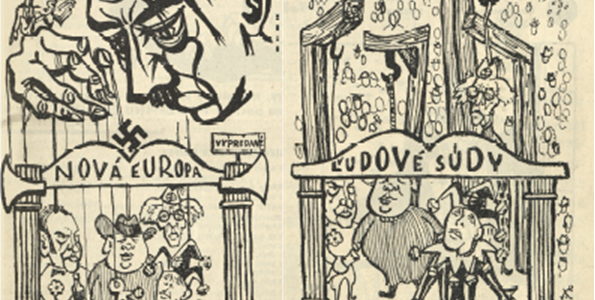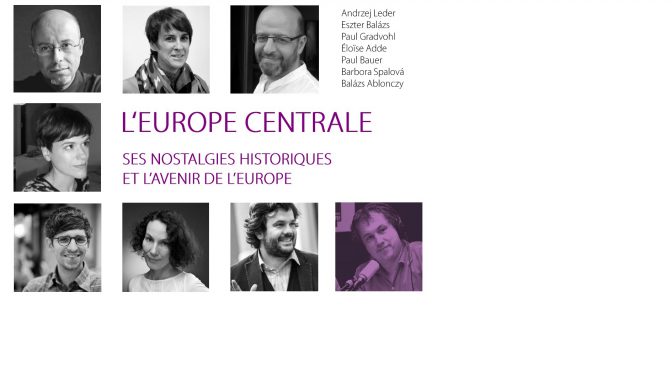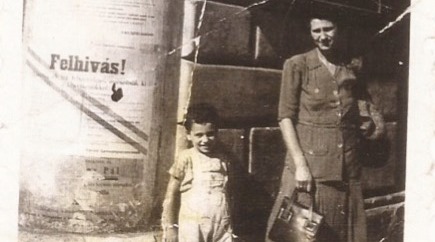
A lecture by Michala Lônčíková (Comenius University, Bratislava) in the frame of the seminar on Modern Jewish History of the Institute of Contemporary History (AV ČR) and CEFRES in partnership with the Masaryk Institute (AV ČR).
Where: CEFRES library, Na Florenci 3, 110 00 Prague 1
When: from 5 pm to 6:30 pm
Language: English
Similarly to other European countries that, immediately after the war, were facing the aftermath of German occupation and collaboration, a system of retributive justice was established in the restored Czechoslovakia as well. Even though anti-Jewish atrocities did not represent an exclusionary question in the lawsuits in the newly established People’s Courts, racially motivated crimes in general were covered in various paragraphs of the main retributive regulation, no. 33/1945 Sb. n. SNR. Analysing the trials of the main political representatives of the wartime Slovak State, which were held in the National Court, partly enables one to trace out the official anti-Jewish policy and its mechanisms at the state level. On the other hand, regional cases, which were in the jurisdiction of the District People’s Courts, also raise the question of the responsibility of local aggressors, co-perpetrators, and eye-witnesses amongst the Slovak majority. This microhistorical perspective is crucial for analysing the Jewish-Gentile relationships in their wider social context in the years of persecution and partly in its aftermath. Using the collections of the District People’s Court in Banská Bystrica, this presentation explores the struggle of Holocaust survivors in Slovakia for justice and the ways in which these crimes were judged in the early years after the Liberation.
Read more about the colloquia!

CEFRES is thrilled to welcome the team of the French radio show devoted to history La Fabrique de l’Histoire for a series of four shows (to be broadcast in December 2017 on France Culture radio station) dedicated to East-Central Europe. A roundtable led by radio host Emmanuel Laurentin gathering four historians will tackle East-Central Europe relationship to nostalgia, the past and the future of Europe. The roundtable will follow a workshop on “The Political Uses of the Past and Collective Memory in Central Europe”.
Both the workshop and the roundtable of the Fabrique de l’Histoire are open to the public!
Where: Kino 35, IFP, Štěpánská 35, Prague 1
Times: 3 pm-6:30 pm for the workshop, 7-8 pm for the roundtable of the Fabrique de l’Histoire
Organizer: CEFRES, with the support of French Institute in Paris (programme “New intellectual scenes”) and of the French Institute in Prague
Language: French
7 pm–8 pm
ROUND TABLE HOSTED BY EMMANNUEL LAURENTIN (France Culture)
- Balázs Ablonczy (Hungarian Academy of Sciences)
- Pauli Bauer (Charles University)
- Paul Gradvohl (University of Lorraine)
- Barbora Spalová (Charles University)
3 pm—6:30 pm
WORKSHOP — Utilisations politiques du passé et mémoire collective
Éloïse Adde (Luxemburg University) : Mythe et actualité de Charles IV
Eszter Balázs (János Kodolányi & Kassák Museum) : La révolution de 1956 soixante ans après : comment la politique mémorielle veut façonner à son image la mémoire collective
Andrzej Leder (Polish Academy of Sciences) : La révolution des somnambules. Les années 1939-1956 en Pologne
Barbora Spalová (Charles University) : L’économie morale des mémoires religieuses en République tchèque
Balázs Ablonczy (Hungarian Academy of Sciences) : Mémoires superposées : guerre, sortie de guerre, paix
Paul Bauer (Charles University) : Nostalgie et mémoires allemandes dans les Pays tchèques
Paul Gradvohl (University of Lorraine) : Nostalgies socialistes, nostalgies du socialisme (Hongrie, Pologne)

Selling Souls: Trafficking German Migrants, Europe and America, 1648-1780
A lecture by William O’Reilly (Trinity Hall, University of Cambridge)
Time & Venue: 5:30 PM at CEFRES (Na Florenci 3, building C, 3rd floor – conference room)
Language: English
Organizer: Veronika Čapská (FHS UK)
 William O’Reilly is a senior lecturer in Early Modern History at the University of Cambridge, associate director at the Centre for History and Economics and full-time fellow at the Institute for Advanced Study in Budapest. He has worked on a range of topics in early modern European and Atlantic history, and is particularly interested in the history of European migration, colonialism and imperialism. He serves on the International Advisory Boards of the Historical Journal and Themes in Migrations.
William O’Reilly is a senior lecturer in Early Modern History at the University of Cambridge, associate director at the Centre for History and Economics and full-time fellow at the Institute for Advanced Study in Budapest. He has worked on a range of topics in early modern European and Atlantic history, and is particularly interested in the history of European migration, colonialism and imperialism. He serves on the International Advisory Boards of the Historical Journal and Themes in Migrations.
Abstract:
Selling Souls investigates the history of seventeenth and eighteenth-century German emigration to North America and Central and Eastern Europe through the actions of Seelenverkäufer, the ‘soul-selling’ traffickers who recruited and escorted migrants and who bridged divides in geography, in literacy and illiteracy, in economic security and insecurity, in freedom and servitude. As the fashion for emigration grew in Europe after the great depopulation and general upheavals of the Thirty Years’ War, so did the proclivity of recruiters. It was virtually impossible in seventeenth and eighteenth-century Europe to contemplate emigration without coming under the influence of an agent or advertiser. They were scoundrels and saviours in differing measure and without their actions the entire process of early-modern migration would have been inconceivable. As such, they laid the groundwork for subsequent mass migration in the nineteenth and twentieth centuries.
Selling Souls considers the role of colonist recruiters in the creation of a complex network of communication that encompassed an expansive Atlantic World, from Pennsylvania to Transylvania. Without the actions of migrant recruiters, informal webs of contact and communication could not have been maintained among migrants and, by extension, further migration might not have taken place.

Second session of the common epistemological seminar of CEFRES and IMS FSV UK,
Yuliya Moskvina (FSV UK & CEFRES)
Critical Actor and Political Critique
Where: CEFRES library – Na Florenci 3, 110 00 Prague 1 (to be confirmed)
When: from 3:30 pm to 5 pm
Language: English
Text:
- Paul Blokker: European Crisis and Political Critique of Capitalism. in: European Journal of Social Theory, 17 (3) 2014, p. 258-274.
Read more about the seminar!
First session of the common epistemological seminar of CEFRES and IMS FSV UK, introduces by Clara Royer (CEFRES) and led by Benedetta Zaccarello (CEFRES): On the Concept of Scenario in Contemporary Philosophy
Where: CEFRES library – Na Florenci 3, 110 00 Prague 1 (to be confirmed)
When: every second Thursday from 3:30 pm to 5 pm
Language: English
Texts :
Emmanuel de Saint Aubert: “Le scénario cartésien. Recherches sur la formation et la cohérence de l’intention philosophique de Marleau-Ponty”, Paris, Vrin, 2005, p.272
Read more about the seminar!

A lecture by Éva Kovacs (Vienna Wiesenthal Institute for Holocaust Studies) in the frame of the seminar on Modern Jewish History of the Institute of Contemporary History (AV ČR) and CEFRES in partnership with the Masaryk Institute (AV ČR).
Where: CEFRES library, Na Florenci 3, 110 00 Prague 1
When: from 5 pm to 6:30 pm
Language: English
In the past two decades, thanks to the opening of the digital collections in the United States, Israel, and Europe, the usage of oral history sources became attractive in historical research. These archives hold an enormous number of testimonies, which makes the research easier and faster, but, on the other hand, raises serious methodological questions. Meanwhile, the last survivors who can still give testimonies are passing away – the oral history sources are turning into „normal” archival sources soon. These new developments are challenging the history-writing on the Shoah.
Our case study deals with the everyday life of approximately 15 thousand Hungarian-Jewish deportees who were forced to work in Vienna and its vicinity in 1944-45. The presentation will focus on the Quellenkritik (source criticism) and methodology of using large oral history archives to explore insufficiently documented historical subjects.
Read more about the colloquia!






